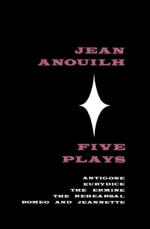|
This section contains 1,806 words (approx. 7 pages at 300 words per page) |

|
SOURCE: "The Tragic Role," in Anouilh: A Study in Theatrics, Yale University Press, 1964, pp. 90-100.
In this excerpt, Harvey investigates Antigone in terms of Anouilh's own definition of tragedy.
Anouilh's approach to tragedy is essentially a theatrical one. For him the stage is set for tragedy when an individual feels himself rooted to a role, irrevocably trapped in a part. What role? what part? The hero himself is not sure. All he knows is that it is his role, and as he plays out this still imperfectly illumined part, the tragedy unfolds. The climax is the epiphany; it is the moment of revelation when the hero finally discovers not his guilt or hubris but his very identity, the meaning of his role. And what is this meaning? Invariably, the role reduces itself to a lust for purity, to a thirst for perfection and principle—in a word, to...
|
This section contains 1,806 words (approx. 7 pages at 300 words per page) |

|


